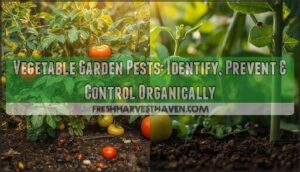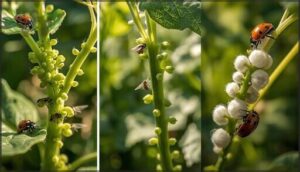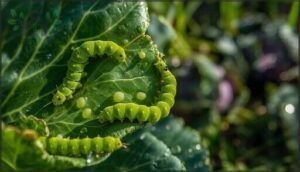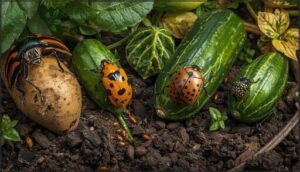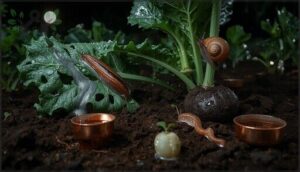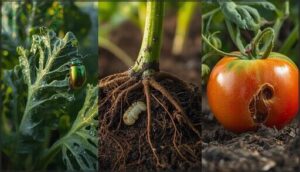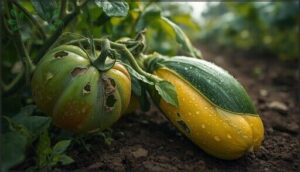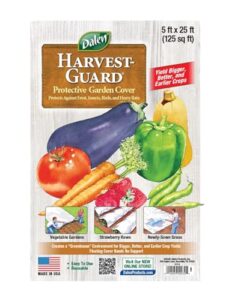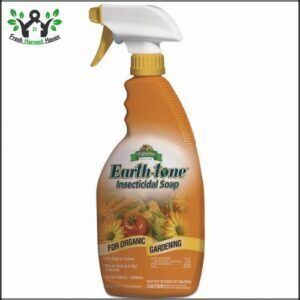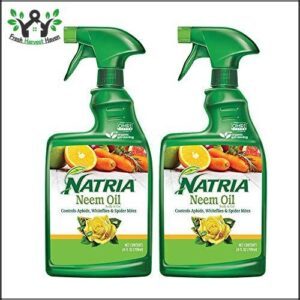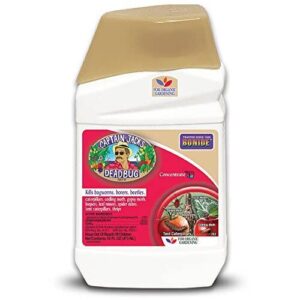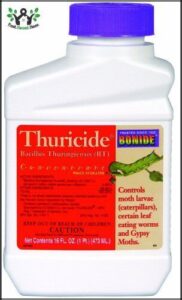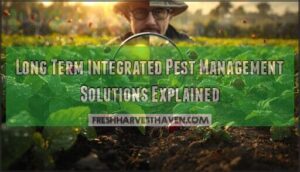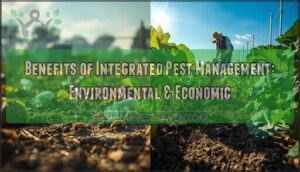This site is supported by our readers. We may earn a commission, at no cost to you, if you purchase through links.
Last season, I watched a gardener lose 40% of her tomato crop to hornworms she didn’t spot until the damage was done. The culprits? Fat green caterpillars that blend so perfectly with tomato foliage, they’re practically invisible until your plants look like lace doilies.
Vegetable garden pests operate on this same stealth principle—they’re masters of disguise, rapid reproduction, and strategic timing. Whether you’re dealing with aphid colonies that appear overnight, beetles that skeletonize your beans in 48 hours, or root feeders causing mysterious wilting, pest damage follows predictable patterns once you know what to look for.
The good news: organic control methods work remarkably well when you match the right technique to the specific pest, and physical barriers often outperform sprays entirely.
Table Of Contents
- Key Takeaways
- Identifying Common Vegetable Garden Pests
- How Vegetable Garden Pests Cause Damage
- Organic Methods for Preventing Garden Pests
- Top 5 Products for Vegetable Garden Pest Control
- Frequently Asked Questions (FAQs)
- What bug is eating my vegetable garden?
- What is the best pest control for vegetable gardens?
- What are the common pests in vegetables?
- How to get rid of vegetable garden pests?
- When is the best time to inspect for pests?
- How do weather conditions affect pest activity levels?
- What are signs of pest resistance to treatments?
- Should I remove infected plants or treat them?
- Conclusion
Key Takeaways
- Early detection and understanding pest life cycles are your most powerful tools—pests like aphids, beetles, and hornworms follow predictable patterns that let you intervene before they cause catastrophic damage.
- Physical barriers like row covers and crop rotation outperform chemical sprays by disrupting pest reproduction cycles and blocking access entirely, often reducing losses from 40% to 5% when used consistently.
- Organic controls (neem oil, insecticidal soap, Bacillus thuringiensis) work best when matched to specific pests and applied during vulnerable life stages, with treatments timed to early morning or evening to protect beneficial insects.
- Healthy soil and beneficial insect populations create a resilient ecosystem where plants naturally outpace pest pressure, making prevention through companion planting and garden sanitation more effective than reactive treatments.
Identifying Common Vegetable Garden Pests
You can’t fight what you can’t see, and garden pests are masters of disguise. Some are so small you’ll spot the damage before you ever catch sight of the culprit, while others announce their presence with bold stripes and clusters of eggs.
Knowing how to identify common invaders is the first step in protecting your herb garden from insects before they do lasting harm.
Let’s walk through the most common vegetable garden invaders so you’ll know exactly what you’re up against.
Aphids, Whiteflies, and Mealybugs
You’ll spot aphids as tiny, soft-bodied clusters on new growth—green, yellow, or even black.
Whitefly traps help catch those moth-like pests hiding under leaves, while mealybug removal starts with identifying white cottony masses on stems. These sap-suckers reproduce fast through complex pest life cycles, but organic sprays like insecticidal soap and biological controls such as ladybugs keep them in check without harsh chemicals.
Scientists have found that the unique nested endosymbiotic system in mealybugs plays a critical role in their survival and adaptability.
Caterpillars and Cabbage Worms
Caterpillars like imported cabbageworms and loopers chew ragged holes in brassica leaves, leaving telltale green frass behind. You’ll find these soft green pests hiding on leaf undersides, where pale yellow eggs hatch in just 3 to 7 days.
Pest monitoring starts with weekly checks, while organic pest control includes handpicking at dawn, Bacillus thuringiensis sprays, and garden sanitation to remove overwintering pupae from crop debris.
For more details about the pests that commonly attack cabbages, see this resource on large cabbage white butterfly caterpillars.
Beetles (Potato, Cucumber, Bean, Flea)
Beetles march through gardens in four notorious battalions. Colorado potato beetles strip nightshade foliage, cucumber beetles spread bacterial wilt, Mexican bean beetles skeletonize legume leaves, and flea beetles pepper young seedlings with tiny shot-hole damage. Understanding the beetle life cycle helps you time organic controls like neem oil or row covers.
Here’s what sets each group apart:
- Colorado potato beetles lay orange egg clusters, producing voracious striped larvae
- Cucumber beetles transmit catastrophic wilt while feeding on cucurbit vines
- Mexican bean beetles cause the harshest damage to bean plants
- Flea beetles jump when disturbed, targeting stressed seedlings in dry soil
Beetle prevention starts with soil management through crop rotation and removing overwintering debris where adults hide.
Slugs, Snails, and Cutworms
While beetles cause damage above ground, slugs, snails, and cutworms attack your garden under cover of darkness. These sneaky pests leave behind shiny slime trails and perfectly severed seedlings by morning.
Slugs and snails chew irregular holes in leaves, while cutworms slice young transplants at soil level.
Copper barriers, beer traps, and plant collars offer organic pest control without chemicals.
Pest Identification by Damage Type
You can often ID the culprit by examining the destruction. Leaf damage with neat holes points to beetles, while sticky residue signals sap-suckers. Stem borers leave entry holes and sawdust trails at plant bases. Root feeders cause mysterious wilting despite watering. Fruit scars with oozing tell you caterpillars struck.
Soil pests like cutworms work at ground level, severing stems overnight—classic vegetable garden pest signatures.
How Vegetable Garden Pests Cause Damage
Garden pests don’t just show up for a casual nibble—they’re waging a full-scale assault on your vegetables, and each type has its own destructive specialty. Some chew through leaves like tiny lawnmowers, others drain the life out of plants one sip at a time, and a few even spread diseases that can wipe out entire crops.
Garden pests wage a full-scale assault on your vegetables—chewing through leaves, draining plant life, and spreading crop-destroying diseases
Understanding how these pests actually damage your garden is the first step toward stopping them in their tracks.
Chewing, Sucking, and Boring Insects
Garden pests inflict damage in three distinct ways, and recognizing the method helps you choose the right Organic Pest Control approach. Chewing insects like Tomato Hornworms and Cucumber Beetles devour entire leaf sections with powerful mandibles, while sucking pests such as Aphids and Squash Bugs pierce plant tissue to extract sap. Understanding Insect Behavior Patterns and Insect Life Cycles lets you time interventions for maximum impact.
- Chewing insects create ragged holes and skeletonized leaves
- Sucking pests cause yellowing, curling, and honeydew secretions
- Leaf Miner larvae tunnel between leaf surfaces, leaving winding trails
- Boring insects weaken stems and roots from the inside out
Disease Transmission by Pests
Many pests act as couriers for Vector Borne Diseases, introducing pathogens directly through feeding wounds. Aphids shuttle Viral Disease Spread between crops, while Whiteflies transmit tomato yellow leaf curl virus in warm seasons. Bacterial wilt moves via Cucumber Beetles chewing stems, and Fungal Spore Transmission hitches rides on slug slime.
Understanding these Pest Pathogen Links and Bacterial Infection Routes protects your harvest from cascading failures.
Root and Leaf Damage Patterns
You can decode what’s happening underground and above by reading damage signatures left by common garden insect pests. Vein damage, root decay, and chlorosis symptoms tell the story.
- Serpentine trails from leafminers weave under leaf surfaces
- Cyst-like galls on roots signal nematode feeding
- Interveinal yellowing marks sap-sucking insects depleting chlorophyll
- Brown mushy zones in roots indicate fungal rot
- Skeletonized leaves reveal tiny feeders between veins
These leaf injury signs guide your organic pest control strategies.
Economic Impact of Pest Infestations
Pest damage hits your wallet harder than you’d expect. Crop yield loss can slash farm revenue by 20 to 40 percent in bad years, while pest insurance premiums rise when outbreaks strike. Trade impacts from quarantines disrupt local markets, too.
That’s why integrated pest management and organic pest control build economic resilience—they cut long-term costs and stabilize your vegetable garden’s productivity.
Organic Methods for Preventing Garden Pests
You don’t need to drench your garden in chemicals to keep pests at bay. Prevention is your best defense, and organic methods work with nature instead of against it.
Here are four proven strategies that’ll help you stop pest problems before they start.
Crop Rotation and Physical Barriers
You can outsmart persistent pests before they even arrive by designing your garden layout with strategic crop rotation and physical barriers. Rotating plant families each season disrupts pest life cycles and balances soil nutrients, while row covers and garden mesh create simple, chemical-free shields during vulnerable growth stages.
Here’s your organic pest management strategy:
- Rotate crops by family – Move tomatoes, peppers, and eggplants to different beds annually, breaking soilborne pest and disease cycles tied to specific hosts.
- Use floating row covers – Drape lightweight fabric over seedlings to exclude cucumber beetles, cabbage worms, and flea beetles during early establishment.
- Plan diverse rotations – Alternate deep-rooted crops like carrots with shallow feeders like lettuce to improve soil structure and reduce pest buildup.
- Install barrier methods early – Surround transplants with cutworm collars or copper tape for slugs before damage occurs, saving you reactive treatments later.
Proper crop planning and soil preparation set the foundation for sustainable gardening practices that minimize pest pressure naturally.
Encouraging Beneficial Insects
Beyond barriers and rotation, you’ll boost organic gardening success by recruiting natural pest control allies directly into your garden ecosystem balance.
Plant flowering herbs like dill, fennel, and yarrow to attract beneficial insects such as ladybugs, parasitic wasps, and lacewings. These predatory insects devour aphids, caterpillars, and whiteflies, while pollinator conservation aids healthy yields.
Insect-friendly plants create beneficial insect habitats that sustain attracting beneficial insects season-long.
Mulching and Garden Sanitation
Mulch benefits go beyond moisture retention—you’re creating an unwelcoming zone for pests when you layer two to four inches of straw or shredded leaves around your vegetables. This organic matter regulates soil temperature, provides weed suppression, and enriches the bed as it breaks down.
Garden cleanup is equally powerful for garden pest control:
- Remove crop debris after harvest to eliminate overwintering pest hiding spots
- Sanitize pruning tools between plants with alcohol wipes to prevent pest spread
- Keep mulch a few inches away from stems to avoid creating damp rot zones
Regular garden maintenance and care using these organic gardening methods fortifies garden health through sustainable gardening practices that starve pests of their habitat.
Planting Pest-Resistant Varieties
Another layer of defense works from the inside out—selecting varieties bred for pest tolerance. Resistant crop selection puts genetic breeding on your side, giving plants natural armor against vegetable garden pests without compromising flavor or yield.
Check seed labeling for resistance codes like VF (Verticillium and Fusarium wilt) or PM (powdery mildew). These markers guide your choices when building crop diversity through organic gardening practices.
| Pest Challenge | Resistant Variety | Resistance Trait |
|---|---|---|
| Aphids | ‘Defender’ beans | Dense foliage deters colonization |
| Cucumber beetles | ‘County Fair’ squash | Bitter compounds repel feeding |
| Hornworms | ‘Iron Lady’ tomato | Thick stems resist larval damage |
Pair pest-resistant varieties with companion planting and organic controls for a complete integrated pest management approach that keeps your garden thriving season after season.
Top 5 Products for Vegetable Garden Pest Control
Sometimes even the best prevention strategies need a little backup, and that’s where organic pest control products come in. You don’t need a chemical arsenal to protect your vegetables—just a few well-chosen tools that work with nature instead of against it.
Here are five reliable products that’ll help you keep pests under control without compromising your organic approach.
1. Harvest Guard Plant Cover
Think of Harvest Guard as a lightweight shield that keeps pests out while letting sunshine and water through. This breathable garden blanket floats over your crops, creating a physical barrier against insects and birds without chemicals.
You can use a single layer for mild protection down to 29°F, or double it up for extra frost defense to 26°F. It traps heat to speed germination, stays reusable season after season, and comes in sizes like 10×15 feet to cover various bed dimensions.
| Best For | Gardeners who want a reusable, chemical-free way to protect vegetables and fruits from frost, pests, and harsh weather without blocking light or airflow. |
|---|---|
| Primary Use | Plant protection |
| Organic Safe | Yes |
| Application Type | Cover fabric |
| Indoor/Outdoor | Outdoor |
| Weight | 6.4 ounces |
| Target Plants | Vegetables, fruits, grass |
| Additional Features |
|
- Breathable fabric lets sunlight and moisture through while keeping insects and birds away
- Works as a lightweight frost blanket (single layer protects to 29°F, double layer to 26°F)
- Reusable across multiple seasons and easy to cut for custom bed sizes
- Won’t hold up in extremely cold temps or strong winds without anchoring
- Pricier than basic options like burlap or plastic sheeting
- May need replacing after a few seasons depending on weather exposure
2. Espoma Organic Insecticidal Soap
Espoma Organic Insecticidal Soap brings the power of plant-derived potassium salts straight to your leafy greens, tomatoes, and peppers. You’ll spray it directly onto aphids, whiteflies, and spider mites, disrupting their cell membranes on contact.
This ready-to-use formula works within hours and won’t leave harsh residues, so you can harvest the same day.
Test a single leaf first to avoid burn, apply during morning or evening hours, and reapply every seven to fourteen days for stubborn infestations.
| Best For | Organic gardeners looking for a plant-safe spray that tackles soft-bodied pests like aphids and whiteflies without leaving harsh residues on edible crops. |
|---|---|
| Primary Use | Pest control spray |
| Organic Safe | Yes |
| Application Type | Ready-to-use spray |
| Indoor/Outdoor | Both |
| Weight | 1.3 pounds |
| Target Plants | Fruits, vegetables, ornamentals |
| Additional Features |
|
- Works on contact within hours and allows same-day harvesting after application
- Safe for vegetables, fruit trees, and ornamentals with no animal-based ingredients
- Ready-to-use spray format—no mixing or measuring required
- Some users report the sprayer mechanism can be unreliable or clog
- Requires repeated applications every 7–14 days for heavy infestations
- Won’t solve every pest problem—less effective against hard-shelled insects or severe outbreaks
3. Natria Neem Oil Pest Control
Natria Neem Oil controls both pests and diseases in one spray, giving your cucumbers, squash, and peppers a double shield. You’ll knock back aphids, whiteflies, spider mites, and beetles while reducing powdery mildew, rust, and black spot on the same pass.
The OMRI-listed formula comes ready to use, so you skip the mixing mess. Coat leaf tops and undersides during cool morning hours, reapply every seven to fourteen days, and keep it away from blooms when pollinators are working your rows.
| Best For | Organic gardeners who want a ready-to-use spray that tackles both pest infestations and fungal diseases on vegetables and ornamentals without waiting for a pre-harvest interval. |
|---|---|
| Primary Use | Pest & disease control |
| Organic Safe | Yes |
| Application Type | Concentrated oil |
| Indoor/Outdoor | Outdoor |
| Weight | 3.54 pounds |
| Target Plants | Roses, flowers, fruits, vegetables |
| Additional Features |
|
- Controls multiple pests (aphids, whiteflies, spider mites) and diseases (powdery mildew, rust, blackspot) in one application
- OMRI-listed for organic gardening and safe to use up to harvest day
- Ready-to-use formula eliminates measuring and mixing steps
- Contains only 1% neem oil, with the remainder being other pesticides
- Can cause leaf yellowing if application instructions aren’t followed carefully
- Ineffective against certain pests like Japanese beetles according to user reports
4. Bonide Dead Bug Brew Concentrate
Spinosad, the active ingredient in Bonide Dead Bug Brew Concentrate, shuts down bagworms, borers, cabbage loopers, and codling moths with neurotoxic precision.
You’ll mix four tablespoons per gallon, drench leaf tops and undersides, and watch chewing pests stop feeding within hours.
This OMRI-approved concentrate stretches your dollar across fruiting vegetables, citrus, and ornamentals, and you can harvest the same day after spraying.
Reapply every seven to ten days if beetles or caterpillars return, and time applications when bees aren’t foraging.
| Best For | Organic gardeners who need a fast-acting solution for caterpillars, borers, and other chewing insects on vegetables, fruit trees, and ornamentals without synthetic chemicals. |
|---|---|
| Primary Use | Insect control spray |
| Organic Safe | Yes |
| Application Type | Concentrated spray |
| Indoor/Outdoor | Outdoor |
| Weight | 1.24 pounds |
| Target Plants | Vegetables, citrus, fruits, ornamentals |
| Additional Features |
|
- Spinosad kills targeted pests within hours while sparing most beneficial insects when used correctly
- OMRI-approved for organic gardening with same-day harvest intervals on many crops
- Concentrated formula mixes easily with water and covers multiple applications at four tablespoons per gallon
- Toxic to honey bees during application, so you need to spray early morning or evening when they’re not active
- Requires reapplication every 7–10 days during heavy infestations, which adds up over the season
- Heavy rain or extreme weather can wash off the treatment before it fully works
5. Bonide Thuricide Worm Control Spray
Bacillus thuringiensis, the live bacterium in Bonide Thuricide, paralyzes caterpillar gut cells after ingestion and kills hornworms, cabbage loopers, and tent caterpillars within two to three days.
You’ll mix the 15% Thuricide concentrate with water, spray upper and lower leaf surfaces until wet, and harvest broccoli, kale, or tomatoes the same day.
This OMRI-listed spray won’t harm ladybugs, earthworms, or birds, but you’ll reapply every five to seven days and after heavy rain to maintain control.
| Best For | Organic gardeners who need targeted caterpillar control on vegetables and ornamentals without harming beneficial insects. |
|---|---|
| Primary Use | Caterpillar control spray |
| Organic Safe | Yes |
| Application Type | Concentrated spray |
| Indoor/Outdoor | Outdoor |
| Weight | 1.28 pounds |
| Target Plants | Fruits, vegetables, shade trees, ornamentals |
| Additional Features |
|
- Kills destructive caterpillars within 2-3 days while leaving honeybees, ladybugs, and earthworms unharmed
- Safe to use up to harvest day on edibles like broccoli, kale, and tomatoes
- OMRI-listed for organic gardening with a naturally occurring bacterium as the active ingredient
- Requires reapplication every 5-7 days and after heavy rain to stay effective
- Lower 15% concentration means you might need more product for serious infestations
- Unpleasant smell and sticky consistency can make application messy
Frequently Asked Questions (FAQs)
What bug is eating my vegetable garden?
You’ll often spot aphids clustering on new shoots, caterpillars chewing through leaves, or tiny beetles riddling foliage with holes. Check leaf undersides and stems for egg clusters or honeydew trails.
What is the best pest control for vegetable gardens?
The best pest control combines prevention with targeted action. Rotate crops, install row covers, and encourage beneficial insects.
Apply organic treatments like insecticidal soap or neem oil only when scouting reveals a problem.
What are the common pests in vegetables?
Your crops face uninvited guests like aphids, whiteflies, caterpillars, beetles, slugs, and cutworms. Each leaves distinct calling cards—stippled leaves, chewed edges, slime trails—that help you identify the culprit quickly.
How to get rid of vegetable garden pests?
You can knock aphids off with a jet of water, apply neem oil weekly for feeding disruption, or use insecticidal soap on soft-bodied pests like whiteflies and mealybugs.
When is the best time to inspect for pests?
Inspect early in the morning before the sun heats up your plants. You’ll catch slugs, beetles, and caterpillars while they’re still active, and dew highlights telltale damage patterns.
How do weather conditions affect pest activity levels?
Temperature and humidity drive pest behavior dramatically. Warm days speed up insect reproduction and feeding, while high moisture levels boost survival rates. Rainfall triggers movement and dispersal, pushing pests into new garden zones.
What are signs of pest resistance to treatments?
Noticing pests bouncing back faster after you spray? That’s your first red flag—resistance is building when treatments knock down fewer bugs or populations rebound within days instead of weeks.
Should I remove infected plants or treat them?
Pull severely damaged plants—over 30 percent infected—to protect neighbors. Treat mild cases with neem or insecticidal soap, then monitor closely. Bag infected material; don’t compost it.
Conclusion
Here’s the truth about vegetable garden pests: you don’t need toxic chemicals to win. The gardener who lost 40% of her tomatoes? She now uses row covers, handpicks twice weekly, and plants marigolds as trap crops—her losses dropped to 5%.
Your success depends on early detection, understanding pest life cycles, and layering multiple organic tactics. Monitor daily, act fast when you spot damage, and remember that healthy soil grows plants strong enough to outpace most pest pressure.

